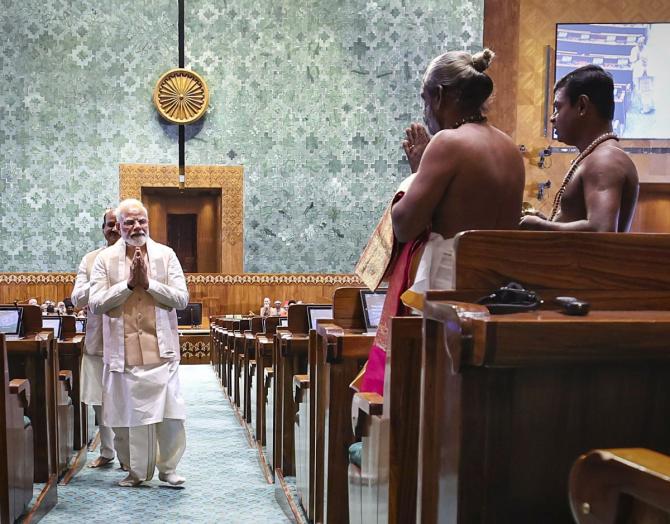We are currently in a transition phase and its resultant turmoil as a titanic struggle between Indian and Western value systems is being waged, argues Colonel Anil A Athale (retd).

On May 28, 2023 as India inaugurated a new parliamentary building, much more than a mere change of premises seem to have take place.
India has shed the last major vestige of colonial rule and replaced it with its own symbols and traditions.
It is interesting that around the same time another country, Turkey, has decisively thrown out the model implemented by Kemal Ataturk.
India, it seems, has finally give up, what Mark Tully once described as 'soul-less' Nehruvian secularist model.
In the last century, many new States emerged on the world scene. The USSR, an erstwhile superpower, barely lasted 75 years.
Another post-1947 creation, Pakistan, broke up within 25 years and is again on the verge of collapse.
In contrast, India, which is more diverse than Europe (many races, languages, religions) is not only holding up, but going from strength to strength.
Europe which attempted unification, has given up after Brexit.
Seventy-five years ago, when India attained Independence, very few gave it a chance of survival.
Most Western scholars argued that once the glue of anti-British sentiment wore out and the generations of tall leaders of the freedom movement passed on, India would disintegrate into many parts.
India, which is more diverse than Europe, has defied these doomsday predictions and continues to remain a united nation and a thriving democracy.
This is nothing short of a miracle for the West as the strong foundation on which India stands is seldom understood and never appreciated.
The issue is further muddied due to the current Hindu phobia that has its origins in Western ideological insecurities.
Within India, at a more fundamental level, many Indians do not accept that India is a 'Nation' and a 'State'.
Many of the persons on the Left and on the 'secular' side claim India is a collection of nationalities and is held together by the Constitution. The issue has caused a great divide within India.
The main problem in India is that a large number of WOGs (WesterniSed Oriental Gentlemen/women) have never understood that India is not just a nation-State (like say France, Germany et al) but a 'civilisational State'.
Indian chatterati (it is wrong to call them scholars) who regularly deride India, are equally to be blamed for not analysing objectively the civilisational values that lead to this 'miracle'.
Also, the wrong diagnosis has led to myths like 'tolerance' and the non-violent nature of Indians as something unique and a part of Indian exceptionalism.
Political theorists have often been puzzled by the fact that a dirt-poor country like India remains a democracy while it is widely accepted (and proven elsewhere) that democracy needs a certain degree of economic prosperity to survive.
This issue is of great importance as India faces multiple challenges in the 21st century.
It is indeed true that we are currently in a transition phase and its resultant turmoil as a titanic struggle between Indian and Western value systems is being waged.
The factors that will shape the outcome of this struggle are beyond a simplistic understanding.
In any case, these mighty forces of history are not easy to understand or control.
Prudence lies in understanding the reality and working with it rather than in opposition to these forces.
There is no gain saying the fact that Indian values are undergoing a change in the process of 'modernisation'.
There is a widely accepted view the world over (and even in some quarters in India) that technology and industry with it bring in 'modern' values, Western/European in origin.
It is even argued that without this change, modernizstion cannot take place.
The Western technological triumphs are often attributed to Hobbesian/Lockean materialism, Kantian logic, and Newtonian science.

At the core of Western civilisation is Hobbes/Locke's Materialism.
'Everything originated in matter including the mind and thoughts.'
Kantian logic puts forward a doctrine of 'pure reason'.
Every phenomenon must be traced to its origin. Finally Newtonian science dictates that 'Hypothesis non fingo'. Every hypothesis must be anchored in verifiable fact.
These basic philosophies spring from the Western understanding of 'Man', the Nature and Man nature relationship.
In the Western view, Man has been defined as an eternally vile and selfish animal.
Thomas Hobbes, the 16th-century English philosopher aptly puts it thus, 'Man in a natural state is in a constant war of everyone against everyone. In continual danger and fear of violent death, man's life, nasty brutish and short!'
Thus was born the basic organiSation of the state in order to control inter-individual conflict and make civilisation possible.
A system of checks and balances is thus inherent to all 'modern' organisations.
This system springs from the basic Western understanding of 'man'.
Even 20th century theories like the 'games theory' applied to nuclear deterrence have pay-off/profit-maximising behaviour as a foundation.
When we relate this philosophy to the realm of security, we have the arms race as the outcome.
The Indian understanding of man is different and more complex.
Man is thought to be composed of 'Tri Gunas' or three attributes.
These are Sat or the Truth or spiritual, Rajo (material and worldly) and Tamo (aggression, violence, and animal instincts).
Thus, all situations and events are explained in terms of clashes between these three, in various permutations and combinations.
Tracing behaviour to these basic tenets, even Ram the Godhead, bowed to Ravan the demon after slaying him.
By doing this, he was acknowledging the 'Sat guna in him.
This is in spite of the fact that he, Ram, fought against the Tamo and Rajo in him.
The Indian penchant for compromise rather than conflict, our celebrated tolerance and lack of killer instinct can all be traced back to this fundamental worldview.
Indians will seldom talk ill of the dead, even he is a scoundrel.
We apologise profusely if our feet accidentally touch others.
Indians have a very strong sense of right and wrong.
These attitudes and behaviour have been shaped by our great epics.
Democracy thrives and survives on the bedrock of 'pluralism' of thought, faith, race, language, and culture. Indian pluralism is based on the acceptance of Tri-Guna in human beings as well as nature.
Unlike the Abrahamic faiths, India has a concept of 'Trinity' -- Brahma the Creator; Vishnu the Preserver; Shiva the Destroyer.
The three Gods seem to thrive without jealousy of competition.
These three principal deities have further evolved into thousands of local avatars.
It is this pluralism in faith that has permeated into tolerance of and acceptance of differences leading to harmonious living.
This pluralism gets wrongly labelled as 'tolerance' even by Indians.
The truth is Indians are as intolerant or violent as anyone else, but acceptance of pluralism has tempered the baser human instincts.

The Indian four-fold division of society based on gunas or attributes and ability and karma or deeds and practice, leads to division of power.
Thus, spiritual power rests with the Brahman or the intellectual, the political power is with the Kshatriya or warrior, the money power with the Vaishya or businessman and manual work duty with the Shudra.
There was untouchability in the original concept and the division was not based on birth!
The modern divisions based on birth and heredity are a grotesque distortion of the original concept.
India can look to other successful stories where Asian nations like Japan have modernised without losing its cultural roots.
What the Japanese or Chinese have done is that while they kept their value system intact, they also embraced Western values in science and technology by separating faith from scientific and other material endevours.
India will do well to follow the Japanese example if it is to progress in the 21st century.
Discarding Western knowledge and methods in scientific progress will be like throwing the baby out with the bathwater.
Colonel Anil A Athale (retd) is a military historian whose earlier columns can be read here.
Feature Presentation: Aslam Hunani/Rediff.com











 © 2025
© 2025